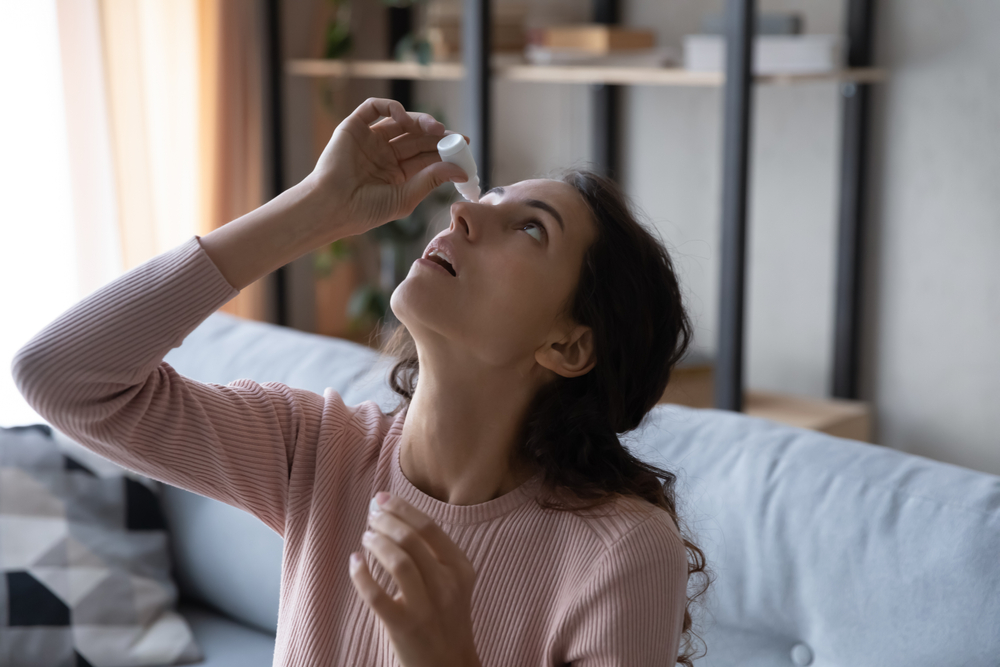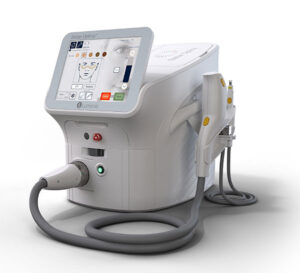Dry Eye
Healthy eyes are continuously lubricated by tears, which keep them comfortable and allow for optimal visual clarity. However, some people can develop issues in the quality or amount of their tears, leading to dry eye and inflammation on the surface of the eyes.
At Dominion Eye Care, our team of experienced eye care professionals will work with you to identify the underlying cause of your dry eye and develop a personalized treatment plan tailored to your specific needs.
What is Dry Eye?
 Healthy tears contain a balance of water, oil, and mucin. These three ingredients blend together to create a film that holds its shape as it spreads evenly across the eye’s surface.
Healthy tears contain a balance of water, oil, and mucin. These three ingredients blend together to create a film that holds its shape as it spreads evenly across the eye’s surface.
Most of the time, the tear film maintains a continuous balance and flow rate, which may increase suddenly to flush away any irritants that might have contacted the eye. Chronic dry eye usually occurs when the body fails to produce enough of one or more of these ingredients in the tear film.
The lacrimal glands, for instance, may not supply enough water, or the meibomian glands may not produce enough healthy oil. An imbalance in any one of the ingredients can leave the surface of your eyes dry, uncomfortable, and inflamed.
What Are Common Dry Eye Symptoms?
People with dry eye typically have one or more of the following symptoms:
- A feeling of stinging or burning
- Red or irritated eyes
- Blurry vision
- A feeling of sand or grit in the eyes
Some people with dry eyes also experience increased tearing. Although this may seem counterintuitive, your eyes may try to alleviate the feeling of irritation caused by dry eyes by producing more tears.
How Do I Know If I Have Dry Eyes?
In many cases, dry eyes will cause numerous symptoms. If you notice any of the most common symptoms of dry eye, it’s important to visit your eye doctor for an eye exam right away.
They will evaluate the surface of your eyes to determine the root cause of your symptoms and the best course of treatment.
What Are The Causes of Dry Eye Syndrome?
Although its symptoms are relatively universal, dry eye has a variety of root causes. People with systemic diseases like rheumatoid arthritis or lupus are at higher risk for dry eye.
Similarly, people who take certain medications for controlling blood pressure, allergies, insomnia, or depression are also more likely to encounter the condition. Dry eye also has a high occurrence in people who’ve undergone corrective surgeries like LASIK or who’ve consistently worn contact lenses over several years.
A person’s environment, such as prolonged exposure to wind, living in a dry climate, or spending long periods in front of a computer screen, can also contribute to dry eyes.
Treating Dry Eyes at Dominion Eye Care
Treating dry eye isn’t a one size fits all approach. The eye doctors at Dominion Eye Care have a number of treatment options to address the full spectrum of dry eye disease, from mild to severe.
Artificial Tears
Many patients find relief using over-the-counter products collectively known as artificial tears. These products contain formulated fluids that closely resemble the natural tears your eye produces.
They can safely be used several times a day to alleviate dry eye symptoms as they occur.
Medications
 There are various prescription medications for dry eye that can target specific causes and symptoms.
There are various prescription medications for dry eye that can target specific causes and symptoms.
- Restasis, Xiidra, Cequa, Vevye
People who have dry eye disease due to a specific type of eye inflammation often benefit from daily use of anti-inflammatory eye drops. These medications work by inhibiting the production of substances in the eye that cause this particular inflammation.
- Steroid Eye Drops
These low-dose medications are useful for patients who have chronic eye inflammation due to issues like allergies or complications after eye surgery. Individual steroid-based medications are formulated in different ways to address specific types of inflammation.
- Doxycycline
This medication is a form of tetracycline antibiotic which also has anti-inflammatory properties, often used to treat eye infections and reduce inflammation. Doxycycline pills can help ease symptoms associated with meibomian gland dysfunction (MGD), the gland responsible for producing the oil component in tears.
- Miebo
Patients who have rapid tear evaporation often benefit from using these medicated drops. Miebo contains specific ingredients that help form a protective layer on the eyes to prevent tears from drying out too quickly.
- Xdemvy
This is a new anti-parasitic medication that eradicates microscopic mites, which can accumulate on eyelash follicles. These mites are one of the causes of blepharitis, which in turn can cause dry eye.
Punctal Plugs
Punctal, or lacrimal, plugs are tiny devices implanted into the puncta, small openings that allow excess tears to drain from the eye. The plug slows or stops tear drainage, allowing more tears to remain in the eye longer.
Punctal plugs can be placed temporarily or permanently, depending on a patient’s overall health condition or the severity of their dry eye symptoms.
OptiLIGHT
The eye doctors at Dominion Eye Care also offer a cutting edge dry eye treatment called OptiLIGHT (IPL). If patients are seeking to reduce the reliance on frequent over the counter medications, prescription medications, or need further relief, the OptiLIGHT treatment is an excellent option for all patients with dry eye. Rather than heat, this device uses a natural light therapy focused on the skin just around the eyes.
A ten to fifteen-minute session can improve dry eye by decreasing inflammation, removing microorganisms causing dry eye, and improving meibomian oil gland performance. The OptiLIGHT treatment can also be applied to the entire face to treat rosacea and other inflammatory skin conditions.
TearCare
At Dominion Eye Care, our dry eye specialists also offer cutting-edge medical devices that can alleviate dry eye symptoms. One of these is the TearCare system for patients with dry eyes due to rapid tear evaporation.
The device applies focused heat to thoroughly clean out backed-up meibomian glands that aren’t producing enough oil to stabilize tear flow.
Autologous Serum Drops
These are specialized eye drops created from a patient’s own blood serum. Once separated from a sample of the patient’s blood, the serum is combined with normal saline and other substances.
The resulting liquid is then stored in sterile eye-dropper bottles for later use. These drops are similar to actual tears but may also contain other custom ingredients that benefit the individual patient.
Amniotic Membrane
An amniotic membrane is a type of natural bandage produced from the cells of human placentas. It’s used frequently by eye doctors to treat a variety of eye problems including keratitis, corneal scars, and certain types of dry eye.
The eye doctors at Dominion Eye Care use VisiDisc and Prokera®, a brand of products made of amniotic membrane widely used by eye care professionals for treating dry eye disease.
Are you experiencing symptoms of dry eye? Schedule an appointment at Dominion Eye Care in Manassas, VA, today!


 OptiLight by Lumenis
OptiLight by Lumenis